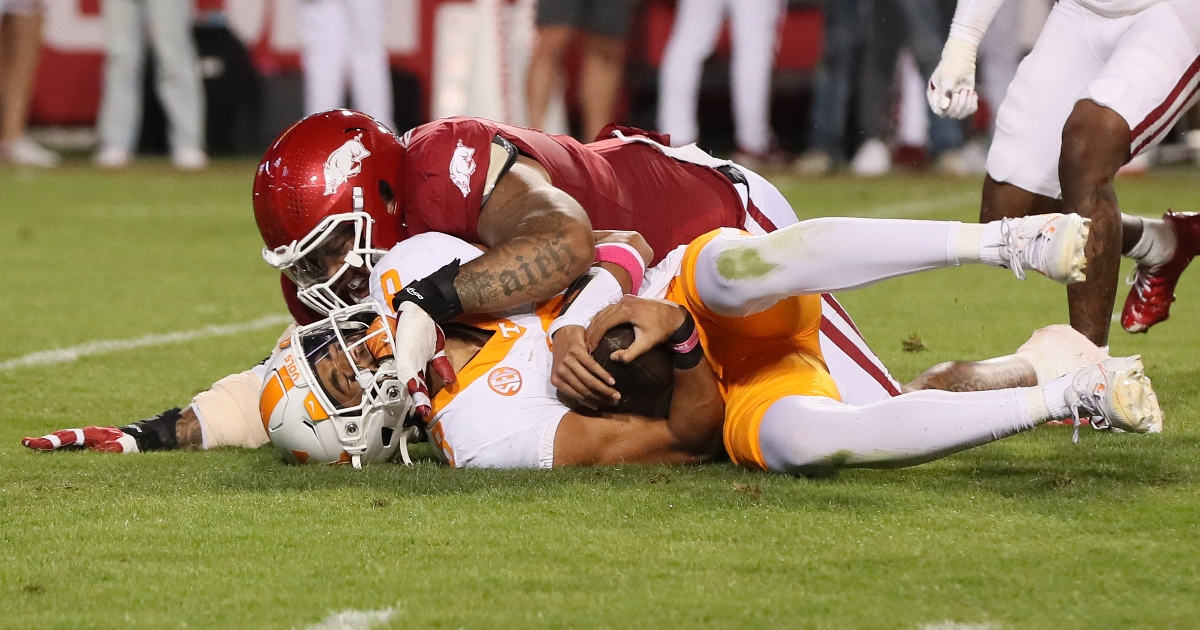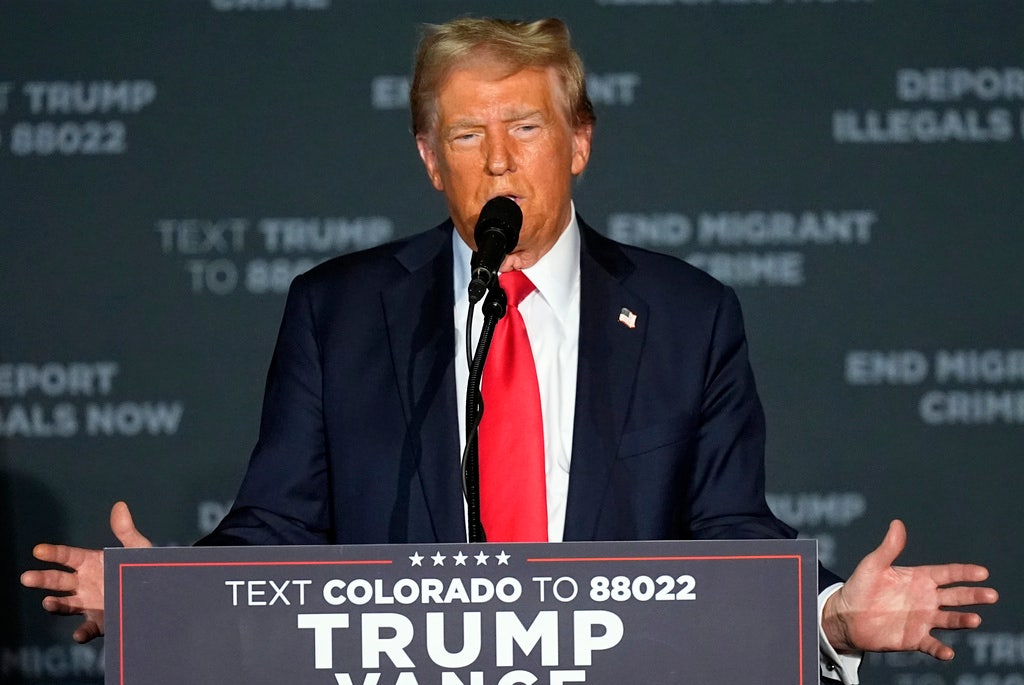Courtesy of Apple TV+
World
Gender of female captain not to blame for sinking of $61M navy ship: New Zealand defense minister
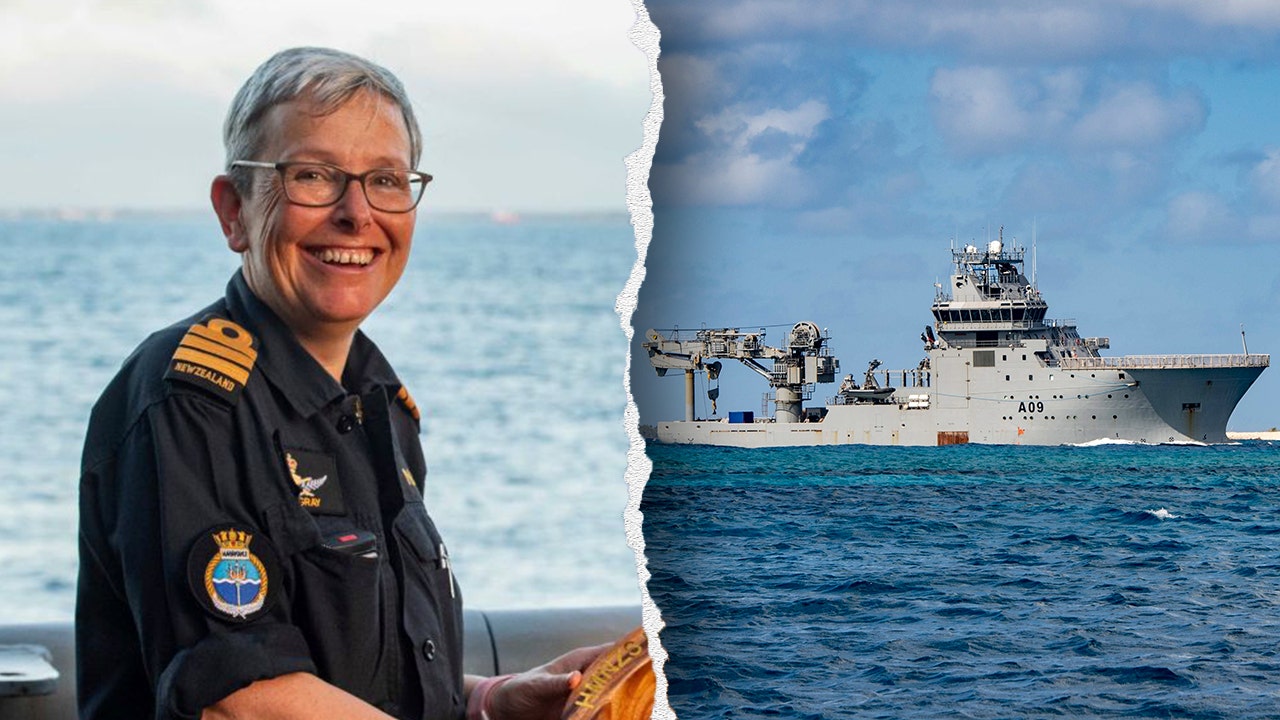
New Zealand’s Defense Minister has clapped back at claims that the appointment of a female to captain a $61 million navy ship ultimately led to its sinking.
The navy’s specialist dive and hydrographic vessel, The Manawanui, sank on Sunday on a reef off the coast of Samoa that it was surveying. Its 75 crew and passengers were ordered to abandon the vessel on life rafts and were later rescued. The sinking marked New Zealand’s first ship lost since World War II and an investigation has been launched into what led to its demise.
The incident sparked debate online about whether the captain, Commander Yvonne Gray, was hired, in part due to her gender and sexuality in accordance with diversity, equity and inclusion (DEI) ideology.
TRUMP ASSASSINATION ATTEMPT SPARKS INVESTIGATION OF SECRET SERVICE DEI POLICIES: ‘COMPROMISED ITS MISSION’
The HMNZS Manawanui pictured in 2022. (Christopher Weissenbornnzdf via AP)
Judith Collins, who is New Zealand’s first female defense minister, rebuked such claims and said there is a “misogynistic narrative” surrounding the sinking. The cause of the sinking has yet to be determined.
“A court of inquiry has been stood up to establish what caused this terrible incident. “The one thing that we already know did not [because] it is the gender of the ship’s captain, a woman with 30 years’ naval experience who on the night made the call to get her people to safety,” Collins said.
She said she was appalled to see the comments online from “armchair admirals, people who will never have to make decisions which mean life or death for their subordinates.”
AMERICAN UNIVERSITIES ARE REBRANDING DEI DEPARTMENTS INSTEAD OF ELIMINATING THEM, STUDY FINDS

Lieutenant Commander Tala Mafile’o of the Royal Tongan Navy presents Commander Yvonne Gray, left, with a carved wooden bowl as a memento of the RNZN’s participation in the 50th Anniversary Fleet Review. (New Zealand Defence Force via AP)
“I thought seriously in 2024 what the hell is going on here with people who are sitting there in their armchair operating a keyboard making comments about people that they do not know, about an area they do not know and they are just vile. Where’s a bit of decency,” Collins said.
She added women in uniform were being abused in the street following the incident.
“This is outrageous behavior and New Zealand is not known for this and we are better than it,” she added. “We are all appointed on merit, not gender,” she added.
The vessel lost power and ran aground on Saturday evening one nautical mile off the southern coast of the Samoan island of Upolu. By Sunday morning, the vessel was “listing heavily,” and smoke was spotted around 6:40 a.m., the navy said. By 9 a.m. the ship slipped below the surface.
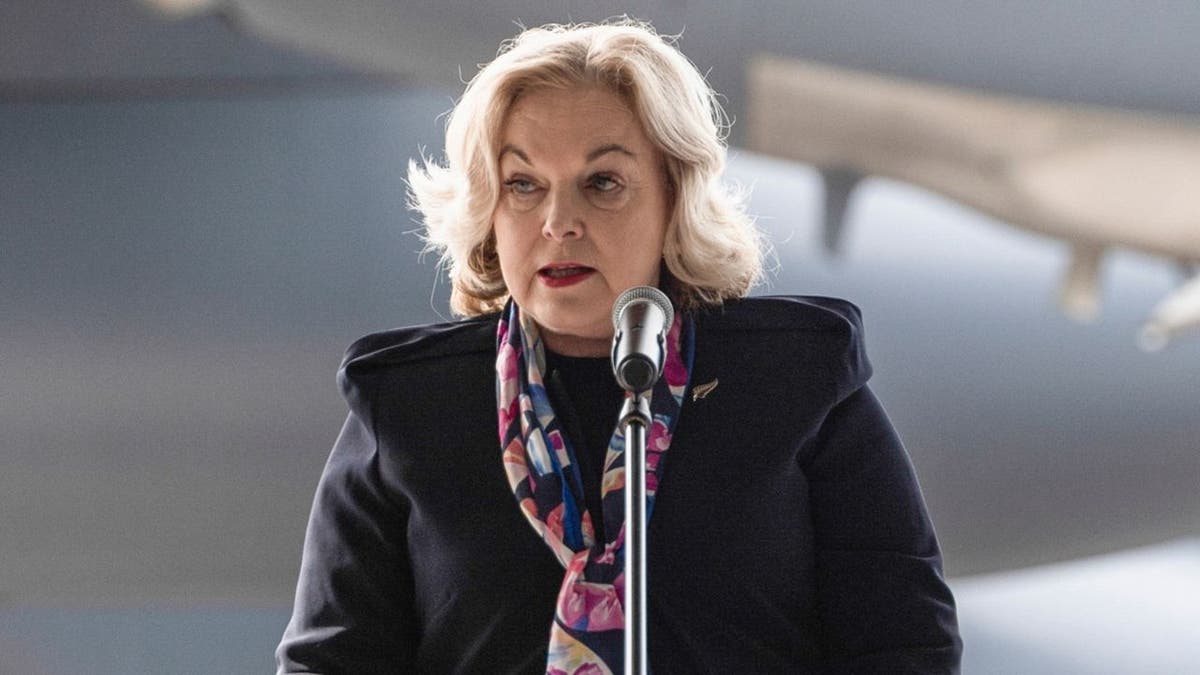
Judith Collins, New Zealand’s defense minister, has rebuked claims that the appointment of a female captain to commandeer a $61 million navy ship ultimately led to its sinking. (AP )
The sinking prompted fears of a major fuel spill. On Thursday, officials in Samoa said while the vessel was leaking oil from three places, the amount was decreasing each day and was dissipating quickly due to strong winds in the area.
Passengers, including civilian scientists and foreign military personnel, left the vessel on lifeboats in “challenging conditions” and darkness, New Zealand’s Chief of Navy Rear Admiral Garin Golding told reporters after the sinking.
The vessel had been in service for New Zealand since 2019, was 20 years old and had previously belonged to Norway. The military said the ship, purchased for $61 million ($100 million NZ dollars), was not covered by replacement insurance.
The Associated Press and Reuters contributed to this report.

World
‘Pachinko’ EP Soo Hugh on That Big Season 2 Finale Secret, Why Blackpink’s Rosé Covered Coldplay and the Show’s Uncertain Season 3

SPOILER ALERT: The following interview contains spoilers from “Chapter 16,” the Season 2 finale of “Pachinko,” now streaming on Apple TV+.
The Apple TV+ drama “Pachinko” has once again delivered emotionally fraught season finale.
The time-jumping family drama about Korean immigrants, based on Min Jin Lee’s 2017 novel, put the focus of the season-ender primarily on a college-aged Noa (Tae Ju Kang) in 1951, as he experiences not only college life and his first serious girlfriend, but also finally arrives at the point we’ve been waiting for all season — his finding out that the wealthy and corrupt businessman Koh Hansu (Lee Min-ho) is his biological father.
Also, in the 1989 storyline, the older Sunja (Youn Yuh-jung) ends her budding romantic relationship, while her son Mozasu (Soji Arai) must confront someone from his past as he attempts to stop his ambitious son Solomon (Jin Ha) from going down a dark path he knows all too well.
“Pachinko” showrunner Soo Hugh talked to Variety about what all these storylines coming to a head mean for the characters, how she got international pop star Rosé from Blackpink to cover a Coldplay song for the episode — and the future of the drama, since a Season 3 renewal has yet to come.
First of all, by the time we get to the end of Season 2, where are we with how the book unfolds?
I would say for the present-day storyline, it’s all pretty new, because we already caught up to the book in Season 1. For the past storyline, I feel like the foundation and a lot of the outlines are still there. We’re still in the book’s timeline for this past.

Courtesy of Apple TV+
This is a really big episode for Noa. How much do you think he actually has known about his father even if he didn’t admit it to himself?
There’s a line Hansu says to Sunja [Minha Kim] that he’s a smart kid and he’s going to find out. I think he has this inkling that something feels off, but I don’t think in his mind he can even understand that it’s possible for his mother to have had a baby out of wedlock. Those definitions don’t exist for him. He knows something, but he has no idea what that is.
In the scene where Hansu is confronted by Noa, Hansu has a choice not to tell him — but instead he tells him everything. Did you ever think about him not telling him, or did it have to happen?
I definitely wanted that moment. The camera lingers on Hansu’s face for a minute, and if you look closely, he even tears up slightly in that shot. Part of him knows that he’s cursing his son in that moment by telling the truth, but he’s been waiting for so long to do it. He’s waited 20 years to tell him, “I’m your father.” It’s really like “Star Wars!”
How much alike do you think Noa is compared to Hansu? We see some flashes of Noa’s anger in this episode that’s similar to Hansu’s.
Well, it’s interesting the way he reacts when Akiko [Kilala Inori] says, “Noa, Hansu is your father,” and his first instinct is this huge, violent push. Then, afterwards, you see this fear in his eyes. I think he realizes “This blood that runs through this man, this blood that does have that propensity to violence, perhaps it’s in me as well.”
When Noa goes back home to see his mother one last time, he doesn’t tell her he knows. Later, she says that that was his mercy. Is that how you see it?
It’s funny. When you shoot scenes, you always want to give yourself as much room as possible to reinterpret those scenes in the edit room, right? But you have to make decisions and in the edit room we had to. The editor and I had to pick the moment when Noa decides he’s going to leave. “When is he going to abandon his name? When is it?”
There’s one cut where he decides earlier with Hansu. If you look closely, when Hansu says, “I’ll make them grovel upon your feet,” there’s this look where Noa is breathing really hard — and all of a sudden, you see him calmly breathe, he catches his breath and he gets really still. In the editing room, we said, “That’s the moment.” So, when he goes to Sanja, he’s already made up his mind, and there doesn’t need to be an argument because his decision won’t be swayed. He’s really come to say goodbye.
I’m just glad he’s still alive in the end, since this show does have its tragedies. I was worried he might kill himself, or truly disappear but then we see him in Nagano.
There was discussion whether or not we needed the Nagano scenes at the end. Some people felt “Why do we need this?” And it’s for exactly your reason. It felt like schmuck-baiting not to have it.
We see that Sunja is destroyed by Noa leaving, but how is this going to affect Hansu?
Equally. He’s so affected, because he’s wanted to be the father for so long, but there are ways of dealing with it that are going to be very different. We’ve always said that are two very different worldviews of how they look upon the rules of the world. In the episode’s last shot of Hansu, he looks straight into the camera and it’s almost like he is looking at us and saying, “OK, this is who you want me to be. I’ll be your monster.” If there is a Season 3, we get to see that spiral continue.
A monster of his own making, right? He’s orchestrated a lot of this.
That’s really interesting. I don’t know if Hansu would say it was of his own making, in some ways. I don’t know if he would, but that’s interesting.
Once we see Noa in that Nagano scene, he doesn’t just change his name, but also says he’s not Korean. How significant is that to the story you’re telling, given the show is so much about the identity of Koreans in this Japanese world?
What’s interesting is if you did a shot of people walking on a street in Japan, you would not be able to pick out who the Koreans were, because it’s a homogenous country. Koreans look similarly within the band of Asian-ness. It isn’t until, perhaps, someone opens their mouth or you hear about their families that you understand, “Oh, you’re not Japanese.” But Noa was born in Japan. He speaks Japanese like any other Japanese child, so in his mind, he’s just becoming who he’s meant to be. Which could have tragic consequences for him.
The narration over the final scenes with the dialogue about shadows is really beautiful, and fitting for all of these characters. Is that from the book?
It’s not from the book. It was actually in Season 1 originally, but we cut it. When Sunja goes into the water after Hoonie’s [Lee Dae-ho] death, we hear Hoonie’s voiceover say, “Dear Sunja…”This was dialogue that was supposed to go there and it didn’t work. It was too abstract at that time. We wrote it so that Hoonie did a more direct address to Sunja, but I’ve always loved this dialogue. I always loved this metaphor of the horses. And I was like, “Try it again here. Let’s see if it works.” And for some reason, it did work better here.
In the 1980s timeline, the older Sunja has been getting close to Kato (Jun Kunimura) but is ending their relationship since Mozasu thinks he just wants the family’s money. But you give Kato a chance to tell his own tragic story. Why was that important?
Maybe this was just totally naive of me, but it wasn’t until we were conceiving his character that we realized every Japanese man in that age range would have been in World War II, so every man of that age has a story of some sort. It’s almost like the ordinariness that becomes extraordinary, which really is so much of the heartbeat of this show. He tells this really harrowing story, but I love his performance because he’s very matter of fact. It’s been 50 years that he’s dealt with it, and he’s processed it. It just felt really honest.
Let’s talk about Solomon and his father, Mozasu, who doesn’t directly tell his son not to go down this dark path in his business but instead goes to Mamoru Yoshii (Louis Ozawa), Solomon’s boss, who he has history with, to stop this. What does that say about this father-son relationship?
So many families I knew that were from the Asian immigrant community, and I feel like I’ve also heard this from a lot of immigrants, not just Korean or Japanese, but it’s amazing how so many things could be solved if you just talk about it. Like this whole Thanksgiving dinner does not have to be this dramatic: If someone had just said what’s bothering them, and communicate!
I think it’s so much more of this time period, especially of this generation. Mozasu feels like he’s a failed father if he voices it out loud. One of the things we said about the show was, as the seasons go on, the past and present are going to collide, so we get more of that backstory and why Mozasu is so haunted as we go on.
The last we see of Solomon is when he gets the news of the death and possible suicide of Katsu Abe (Yoshio Maki), which he’s responsible for indirectly by calling in his loan. What does that mean for Solomon moving forward?
I always find it funny that you aim for something, and then when you get it, why does it not taste as sweet? And we as humans know it never works out that way, ever. And then we just put another rung on the ladder to reach for hoping that’s going to be the sweet bite of the apple. Solomon, he’s 28 years old. I had nothing figured out at 28, so at the end of the season we shouldn’t expect him to have it all figured out. But he’s starting to get an inkling that it wasn’t right.
It’s also a big deal that Rosé from Blackpink sings the Coldplay song “Viva La Vida” at the end of the episode. How did that come about?
I knew there was going to be a needle drop there. And very early on, I thought it was going to be the Coldplay song, but I really resisted that. I loved that if you listen to the lyrics of that song, they really speak to our show — and specifically Noa. But I was worried that it was just too well known and that if we put that in, it was going to pull people out.
We tried, I think, 200 songs, but then I went back to the Coldplay song and I realized it’s just that Chris Martin’s voice is so well known so what happens if we don’t use Chris Martin’s version? We were looking at different covers, and then Rose’s name came up being like, “Hey, do you think she would ever cover it?” I thought it was a pipedream, but it turns out she really had a connection to that song. The whole song is beautiful. We recorded and mixed the whole song as a single, so we’re hoping to be allowed to drop it soon.
With this show that talks a lot about the past and the present, what’s the future for “Pachinko?” Should we be hopeful for a third season?
You call and ask them. We have so many more stories to tell. One of the things that we’re battling is there’s just so many shows out there, right? Our fans are the best fans, and we’ve been blown away by how generous the critics are. But I think it’s just really hard to make noise in this time and space.
This interview has been edited and condensed.
World
Forgery lands former Australian rugby star in French jail
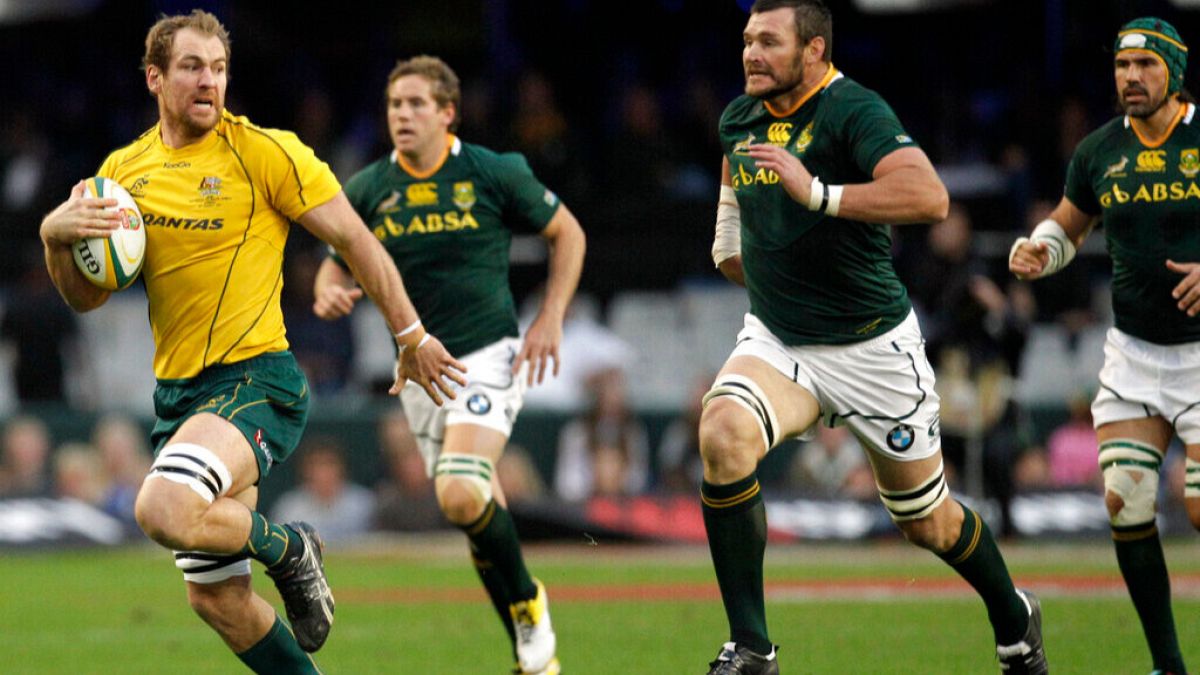
An international arrest warrant has been issued to Rocky Elsom, the former captain of the national Australian rugby team, due to forgery while helming a French rugby club.
Former Wallabies flanker Rocky Elsom was found guilty of misusing corporate assets by a French court on Friday.
He was sentenced five years in absentia and ordered to pay back 700,000 euros of assets he squandered while being the president of the Narbonne French rugby club from 2015-16.
The 41-year-old played 75 times for Australia from 2005-11 and represented Irish club Leinster, winning the 2009 European Cup.
Elsom has been working as a coach at a school in Dublin, according to a recent interview with Irish press.
Watch the video in the player above to find out more.
World
Bomb survivors use Nobel Peace Prize win to share their anti-nuke message with younger generations
TOKYO (AP) — The recipient of this year’s Nobel Peace Prize is a fast-dwindling group of atomic bomb survivors who are facing down the shrinking time they have left to convey the firsthand horror they witnessed 79 years ago.
Nihon Hidankyo, the Japanese organization of survivors of the U.S. atomic bombings on Hiroshima and Nagasaki, was awarded for its decadeslong activism against nuclear weapons. The survivors, known as hibakusha, see the prize and the international attention as their last chance to get their message out to younger generations.
“We must seriously think about the succession of our messages. We must thoroughly hand over from our generation to the future generations,” Toshiyuki Mimaki, senior member of the Hiroshima branch of Hidankyo, told reporters Friday night.
“With the honor of the Nobel Peace Prize, we now have a responsibility to get our messages handed down not only in Japan but also across the world.”
The honor rewards members’ grassroots efforts to keep telling their stories — even though that involved recollecting horrendous ordeals during and after the bombings, and facing discrimination and worries about their health from the lasting radiation impact — for the sole purpose of never again let that happen.
Shigemitsu Tanaka, the chairman of Nagasaki Atomic bomb Survivors Council, cries during a press conference, in Nagasaki, western Japan, Friday, Oct. 11, 2024, after Nihon Hidankyo, or the Japan Confederation of A- and H-Bomb Sufferers Organizations, won the Nobel Peace Prize.(Kyodo News via AP)
Now, with their average age at 85.6, the hibakusha are increasingly frustrated that their fear of a growing nuclear threat and push to eliminate nuclear weapons are not fully understood by younger generations.
The number of prefectural hibakusha groups decreased from 47 to 36. And the Japanese government, under the U.S. nuclear umbrella for protection, has refused to sign the Treaty on the Prohibition of Nuclear Weapon.
But there is hope, and a youth movement seems to be starting, the Nobel committee noted.
Three high school students accompanied Mimaki at the city hall, stood by him as the prize winner was announced, and promised to keep their activism alive.
“I had goose bumps when I heard the announcement,” said a beaming Wakana Tsukuda. “I have felt discouraged by negative views about nuclear disarmament, but the Nobel Peace Prize made me renew my commitment to work toward abolishing nuclear weapons.”
Another high school student, Natsuki Kai, said, “I will keep up my effort so we can believe that nuclear disarmament is not a dream but a reality.”
In Nagasaki, another group of students celebrated Hidankyo’s win. Yuka Ohara, 17, thanked the survivors’ yearslong effort despite the difficulty. Ohara said she heard her grandparents, who survived the Nagasaki bombing, repeatedly tell her the importance of peace in daily life. “I want to learn more as I continue my activism.”
People visit the Atomic Bomb Museum in Nagasaki, southern Japan Saturday, Oct. 12, 2024, a day after the Nobel Peace Prize was awarded to Nihon Hidankyo, a Japanese organization of survivors of the U.S. atomic bombings of Hiroshima and Nagasaki, for its activism against nuclear weapons. (Kyodo News via AP)
In April, a group of people set up a network, Japan Campaign to Abolish Nuclear Weapons, connecting younger generations around the country to work with survivors and pursue their effort.
Efforts to document the survivors’ stories and voices have grown in recent years around Japan, including in Hiroshima, Nagasaki and Tokyo. In some places, young volunteers are working with hibakusha to succeed their personal story telling when they are gone.
The first U.S. atomic bombing killed 140,000 people in the city of Hiroshima. A second atomic attack on Nagasaki on Aug. 9, 1945, killed another 70,000. Japan surrendered on Aug. 15, bringing an end to its nearly half-century aggression in Asia.
Hidankyo was formed 11 years later in 1956. There was a growing anti-nuclear movement in Japan in response to U.S. hydrogen bomb tests in the Pacific that led to a series of radiation exposures by Japanese boats, adding to demands for government support for health problems.
As of March, 106,823 survivors — 6,824 fewer than a year ago, and nearly one-quarter of the total in the 1980s — were certified as eligible for government medical support, according to the Health and Welfare Ministry. Many others, including those who say they were victims of the radioactive “black rain” that fell outside the initially designated areas of Hiroshima and Nagasaki, are still without support.
-
/cdn.vox-cdn.com/uploads/chorus_asset/file/25439572/VRG_TEC_Textless.jpg)
/cdn.vox-cdn.com/uploads/chorus_asset/file/25439572/VRG_TEC_Textless.jpg) Technology1 week ago
Technology1 week agoCharter will offer Peacock for free with some cable subscriptions next year
-

 World1 week ago
World1 week agoUkrainian stronghold Vuhledar falls to Russian offensive after two years of bombardment
-

 World1 week ago
World1 week agoWikiLeaks’ Julian Assange says he pleaded ‘guilty to journalism’ in order to be freed
-

 Technology1 week ago
Technology1 week agoBeware of fraudsters posing as government officials trying to steal your cash
-
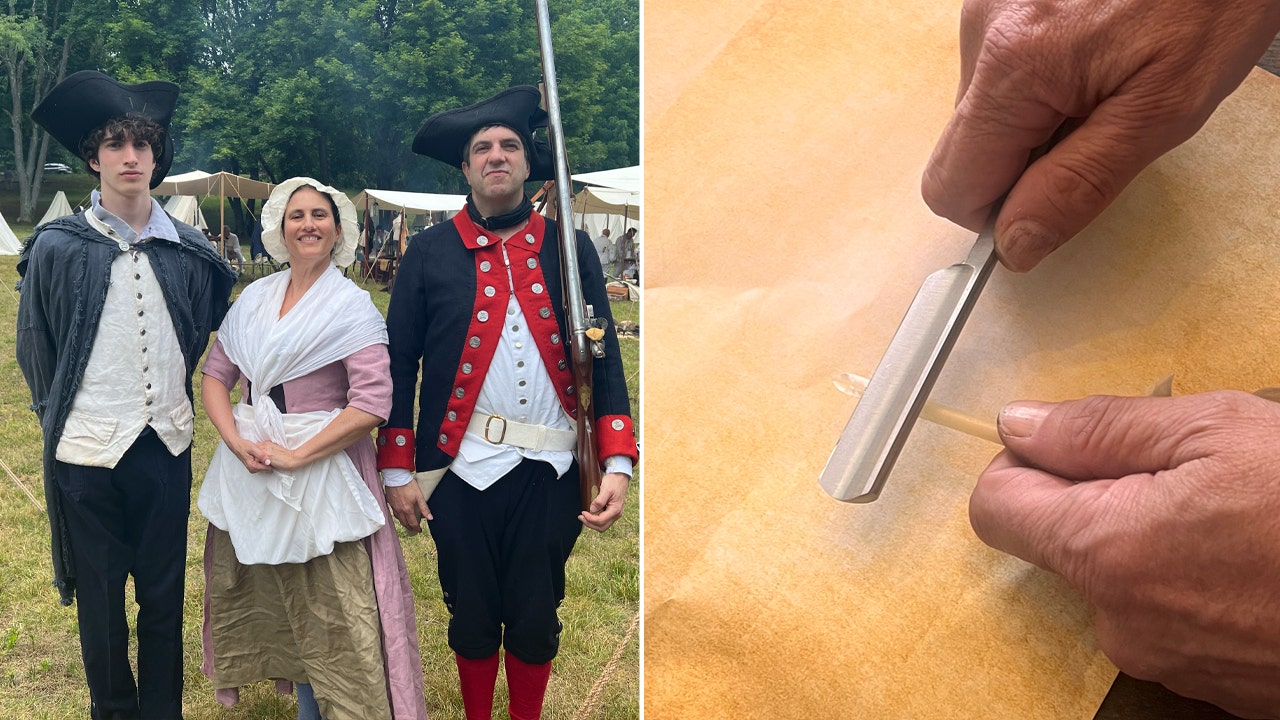
 Health7 days ago
Health7 days agoHealth, happiness and helping others are vital parts of free and responsible society, Founding Fathers taught
-

 Sports1 week ago
Sports1 week agoFreddie Freeman says his ankle sprain is worst injury he's ever tried to play through
-

 News7 days ago
News7 days agoLebanon says 50 medics killed in past three days as Israel extends its bombardment
-
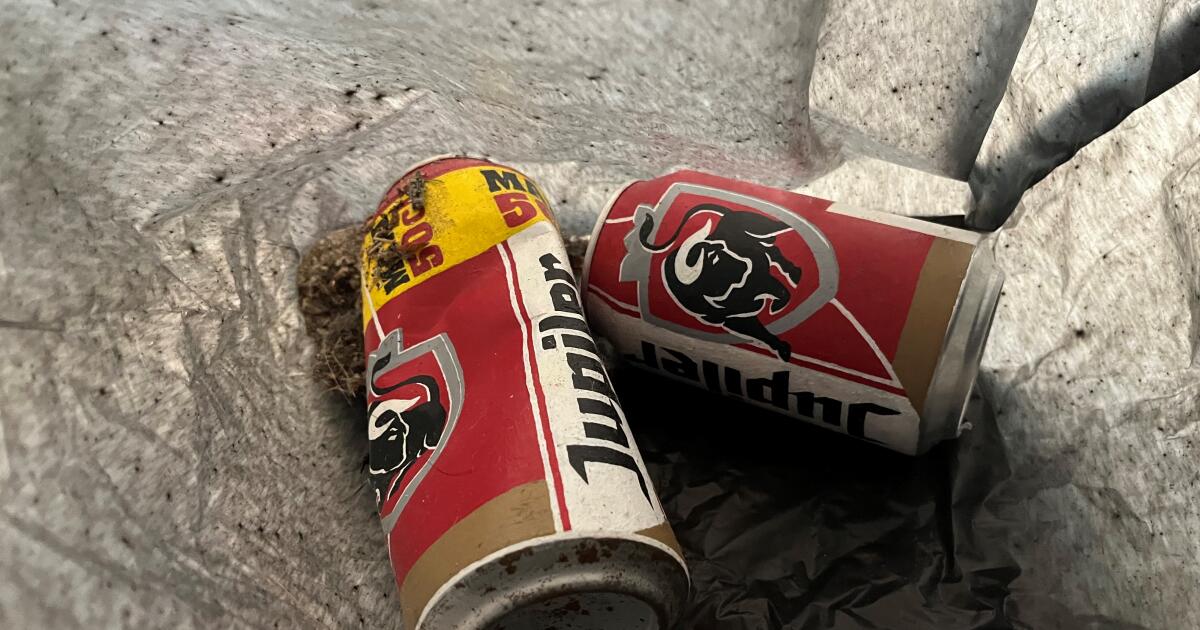
 Entertainment3 days ago
Entertainment3 days agoHold my beer can: Museum says a worker thought unique art installation was trash




